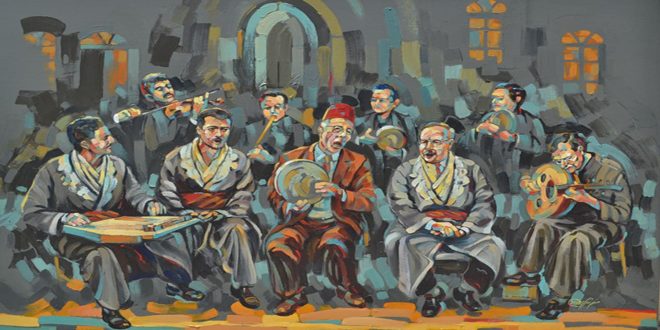Munther Sharabi, is a plastic artist influenced by Aleppo’s architecture and its harsh stones and depicts life of its children
The plastic artist, Munther Sharabi, has a rich artistic career that was filled with hundreds of exhibitions, which he left for the generations to come, in which he made every effort to present a visual language that respects the feelings and mind of the recipient and stimulates his interest. So, many critics describe him as one of the leading contemporary Arab impressionist plastic artists.
Sharabi, who studied art at the Fine Arts Center in Aleppo at the hands of senior plastic artists, was inspired by the depth of society and nature. Colors for him are the main axes in his paintings, which he mixes with his feelings, so that they appear fertile and frank.
Sharabi told SANA correspondent that he was one of the owners of the Impressionist school that wanted to change public taste and transfer reality directly from nature away from imagination. He expressed his admiration for the work of the pioneers of Impressionism such as Monier, Koch and Cezanne.
 Sharabi, who was born in Aleppo in 1948.He was impressed by its architecture, its harsh stones and depicted its children’s life. He wandered among its simple people, contemplating, talking with them and hoarding in his memory the spectrum of their lives then emptying his thoughts into paintings expressing his love and appreciation for them.
Sharabi, who was born in Aleppo in 1948.He was impressed by its architecture, its harsh stones and depicted its children’s life. He wandered among its simple people, contemplating, talking with them and hoarding in his memory the spectrum of their lives then emptying his thoughts into paintings expressing his love and appreciation for them.
Sharabi recovers the names of pioneers in the plastic movement in Syria, whom he studied at their hands and gained from their knowledge and rich heritage. He learnt to choose his subjects from the depth of society, confirming that the artist’s works reflect his intellectual and cultural background, his environment and his society.
Sharabi has been imbued with the love of nature since his childhood as his family used to spend most of the summer vacation in nature. During his studies at the Arts Center , he used to accompany some colleagues for painting in nature, this increased his interest and love for it, so he presented many works that tell the beauty of our country.
Regarding his drawing of portraits of characters from Syrian and Arab history, he believes that this is a duty and right for any artist, whether young or old, to highlight our symbols that spread throughout culture and art in our country and present many creations. Sharabi noted that he presented in his solo exhibition (Aleppo, the scent of the past and the present) a number of Portraits of literary and artistic figures from Aleppo, such as Mustafa al-Akkad, Khair al-Din al-Asadi, Sabah Fakhri, Sabri Mudallal, and other Syrian and Arab personalities.
 Regarding his opinion of the contemporary Syrian plastic movement during the war, Sharabi believes that this movement did not depict the reality of the catastrophe and pain that Syria witnessed , but despite that we have to be optimistic, similar to what the late writer Saadallah Wannous said: “We are condemned to hope”.
Regarding his opinion of the contemporary Syrian plastic movement during the war, Sharabi believes that this movement did not depict the reality of the catastrophe and pain that Syria witnessed , but despite that we have to be optimistic, similar to what the late writer Saadallah Wannous said: “We are condemned to hope”.
Sharabi expressed his satisfaction for what he presented in his artistic career, through which he has participated in more than 200 exhibitions inside and outside Syria since 1966.
Inas Abdulkareem

